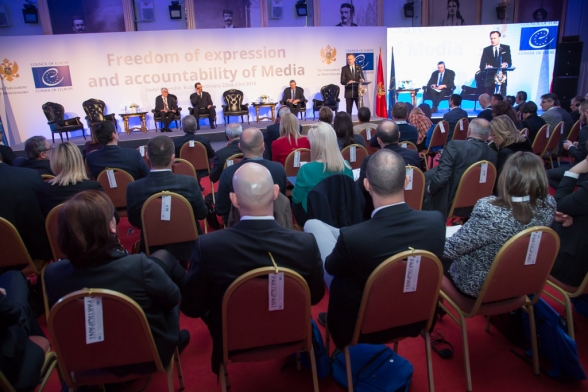The Conference organised by the Parliament of Montenegro in cooperation with the Council of Europe is devoted to the role of public broadcasters, private media and investigative journalism in providing conditions for the protection and improvement of freedom of expression and public debate, but also accountability of media in accordance with their strength and role in the society.
President of the Parliament of MontenegroMr Ranko Krivokapićopened the Conference organised by the Parliament of Montenegro in cooperation with the Council of Europe“Freedom of Expression and Accountability of Media”, welcoming the present.
In his address, President of the Parliament of MontenegroMr Ranko Krivokapić said that public broadcasters had to be objective because they were protected, had monopolistic position, they were given the power of citizens’ support and citizens’ income in order to provide the standard which will be an example for others.
He underlined that he was not one of those who believed that development of democracy would necessarily mean the development of media. Because no political elite or media should have that freedom. He said that media should open room for democracy, and make room for democracy by developing political culture and truthfulness.
Mr Dirk Van Eeckhout– Extraordinary and Plenipotentiary Ambassador, Representative of Belgium to the Council of Europe, Thematic Coordinator on Information Policy (TC-INF), welcomed the present, praising the initiative by the President of the Parliament of Montenegro to organise the conference, which had a very important significance in further democratisation of the society, development of media culture and free expression in Montenegro. In his speech, he said that freedom of expression was a foundation for building a stable society. He added that the public broadcaster had to be objective, independent media outlet, influencing on the development and progress of Montenegrin citizens. He stresses that in the previous period EU media faced rapid and deep changes, while the public broadcasters underwent transition, which should be the case in other states also.
In his address, Mr Mitja Drobnič, Head of the European Union Delegation to Podgorica, said that freedom of expression was fundamental right of every individual. He voiced pleasure over the organising of this conference, saying that freedom of expression was necessary for strengthening democratisation of a society. He said that EU wanted to eradicate intimidation and blocking of public reporting, and that path for that was by sentencing every acts of violation against journalists.
He stated that the public broadcaster should be a driving force in democratisation of the society. He sad on this occasion that the EU was strongly devoted to this aim, providing support in resolving disputable issues on the path of strengthening democratic processes in Montenegro.
~ ~ ~ ~ ~
I session
Topic of the session - Public broadcaster at the service of Power or Public?
President of the Venice Commission Mr Gianni Buquicchioin his address said that the public broadcasters should act in the interest of the public, to cater for the whole of the population on a non-profit basis, and it should serve the democratic needs, but also to strengthen mechanism for development of a contemporary society. He pointed out the importance of communication mechanisms, whose role is conveying credible information to each individual.
The following panellists delivered remarks on this topic: Mr Marko Filli –General Director of RTV Slovenia,Mr Belmin Karamehmedović– Director General of BHRT, Ambassador Mr Gerard Stoudmann – OSCE Special Representative for the Western Balkans, Mr Gvozden Srećko Flego– Former Rapporteur on attacks against journalists and media freedom for the Parliamentary Assembly of the Council of Europe (PACE)
~ ~ ~ ~ ~
II session
Topic of the session - Commercial Media: Diversity or pluralism
Ms Doris Pack- President of Robert Schuman Institute in Budapest, said that she was well familiar with this region where media were a great problem, because there were certain obligations in this sphere that had to be completed. She said that everybody should be accountable for their actions, that transparency was a solution, so the parliamentarians had a lot to work on and feel responsibility, becoming active in building democratic modern society.
Ms Daliborka Uljarević, Executive Director of the NGO Centre for Civic Education, referred to institutional transparency as well as work and acting of the Public Broadcaster in Montenegro, pointing out to the current developments in the field of media.
Mr Petar Komnenić – journalist and editor of show “Načisto” (“Completely Clear”)spoke on the origin of today’s media scene in Montenegro. Additionally, in his address, he was focused on the current media scene in Montenegro and relation of the public broadcaster and politics.
The following panellists delivered remarks on this topic: Mr Dirk Van Eeckhout, Extraordinary and Plenipotentiary Ambassador, Representative of Belgium to the Council of Europe, Thematic Coordinator on Information Policy (TC-INF), Mr Dragoljub Žarković, Editor-in-Chief of weekly VREME, Mr Senad Hadžifejzović, journalist of FACE TV and Mr Mislav Bago, editor of the Informative Programme of NOVA TV.
Prior to the beginning of the conference “Freedom of Expression and Accountability of Media”, President of the Parliament of MontenegroMr Ranko Krivokapić had a meeting with President of the Venice Commission Mr Gianni Buquicchio..
~ ~ ~ ~ ~
Day two of the Conference “Freedom of Expression and Accountability of Media” will be continued on 23 February, starting at 10:00.Topic of the next session is: Investigative journalism vs Kompromat.
![]() Address by Mr Ranko Krivokapić President of the Parliament of Montenegro
Address by Mr Ranko Krivokapić President of the Parliament of Montenegro
![]() Address by Mr Gianni Buquicchio President of the Venice Commission
Address by Mr Gianni Buquicchio President of the Venice Commission









